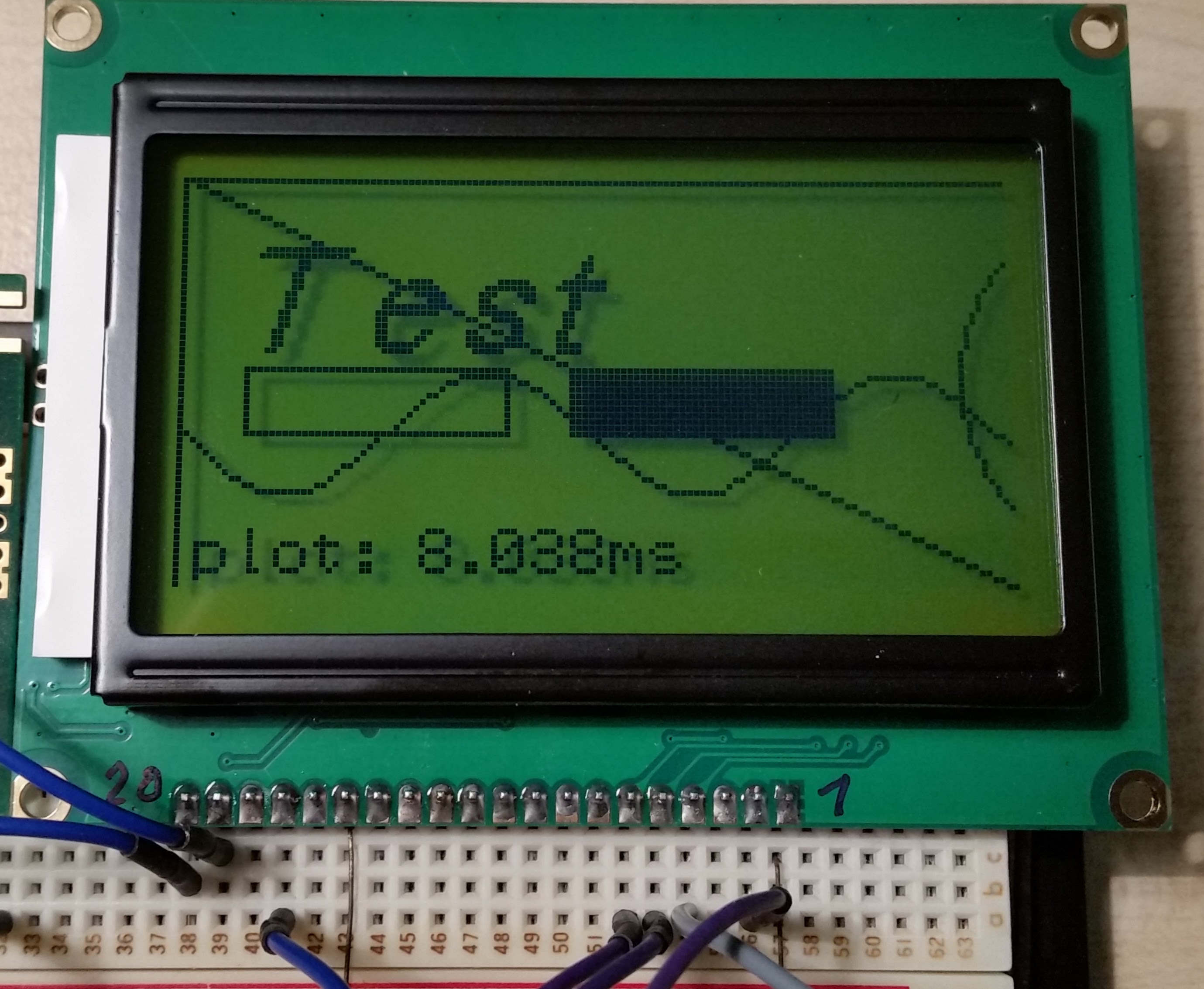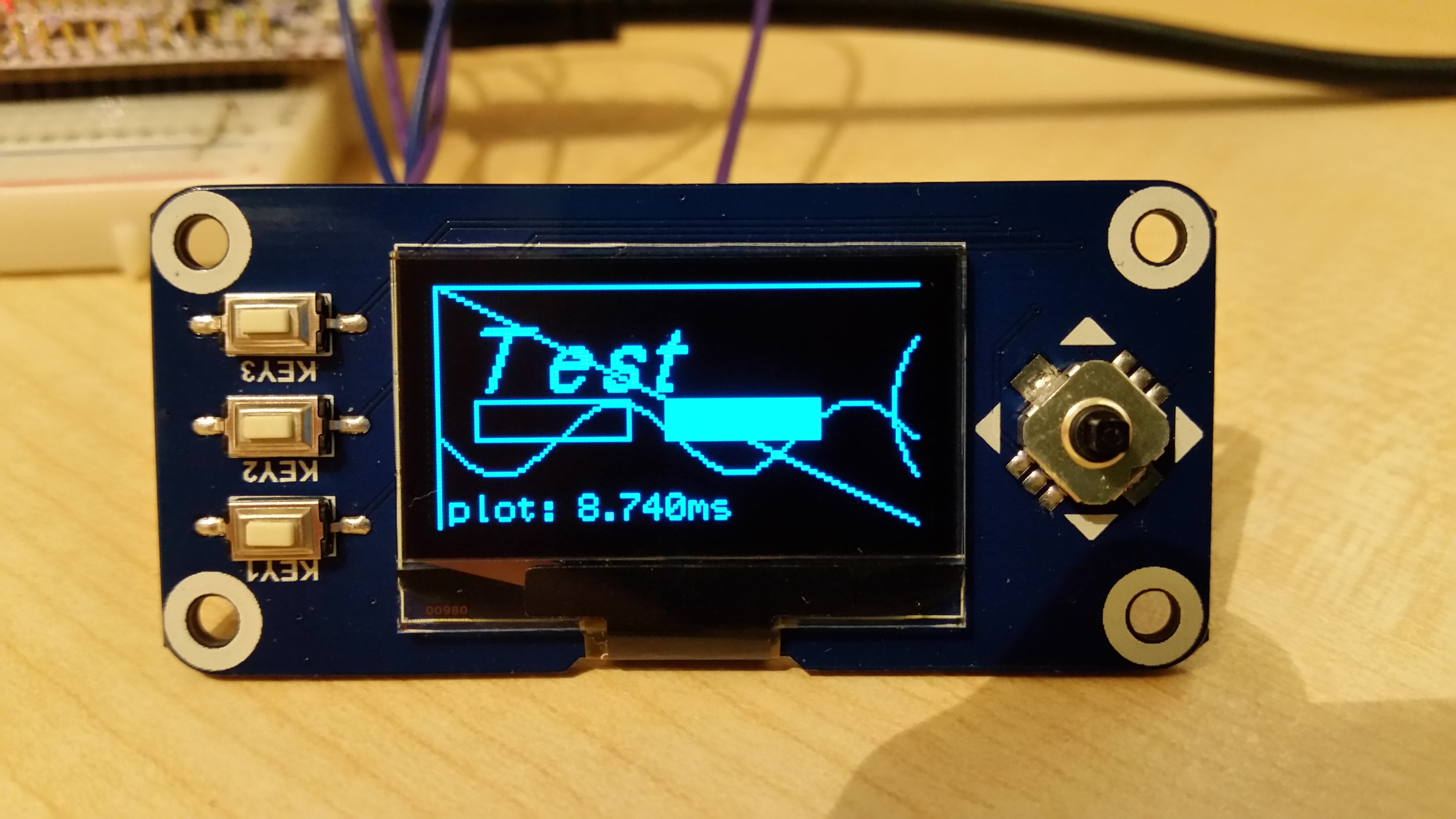UniGraphic-Fork for ST7920-LCD-controller and SH1106. Tested with 128x64 LCD with SPI and 128x64-OLED with IIC
Dependents: UniGraphic-St7920-Test AfficheurUTILECO
Fork of UniGraphic by
Fork of the UniGraphic-Library for monochrome LCDs with ST7920 controller and 128x64-IIC-OLED-Display with SH1106-Controller


Had to adapt LCD for following reasons:
- Give access to screenbuffer buffer[] to parent class
- pixel() and pixel_read() as they are hardware-dependent
- added reset-pin to IIC-Interface
GraphicDisplay:: sends buffer to LCD when auto_update is set to true.
Testprogram for ST7920 can be found here:
https://developer.mbed.org/users/charly/code/UniGraphic-St7920-Test/
Diff: Protocols/SPI8.cpp
- Revision:
- 7:bb0383b91104
- Parent:
- 5:b222a9461d6b
- Child:
- 11:b842b8e332cb
diff -r 8356d48a07db -r bb0383b91104 Protocols/SPI8.cpp
--- a/Protocols/SPI8.cpp Mon Feb 16 01:18:29 2015 +0000
+++ b/Protocols/SPI8.cpp Tue Feb 17 11:02:06 2015 +0000
@@ -135,30 +135,6 @@
_CS = 1;
#endif
}
-unsigned int SPI8::rd_data32_wdummy()
-{
-#ifdef USE_CS
- _CS = 0;
-#endif
- unsigned int r=0;
- _DC.write(1); // 1=data
-
- r |= _spi.write(0); // we get only 7bit valid, first bit was the dummy cycle
- r <<= 8;
- r |= _spi.write(0);
- r <<= 8;
- r |= _spi.write(0);
- r <<= 8;
- r |= _spi.write(0);
- r <<= 1; // 32bits are aligned, now collecting bit_0
- r |= (_spi.write(0) >> 7);
- // we clocked 7 more bit so ILI waiting for 8th, we need to reset spi bus
- _CS = 1; // force CS HIG to interupt the cmd
-#ifndef USE_CS //if CS is not used, force fixed LOW again
- _CS = 0;
-#endif
- return r;
-}
unsigned short SPI8::rd_gram()
{
#ifdef USE_CS
@@ -181,6 +157,50 @@
r = RGB18to16((r&0xFC0000)>>16, (r&0xFC00)>>8, r&0xFC);// 18bit pixel, rrrrrr00_gggggg00_bbbbbb00, converted to 16bit
return (unsigned short)r;
}
+unsigned int SPI8::rd_reg_data32(unsigned char reg)
+{
+#ifdef USE_CS
+ _CS = 0;
+#endif
+ wr_cmd8(reg);
+ unsigned int r=0;
+ _DC.write(1); // 1=data
+
+ r |= _spi.write(0); // we get only 7bit valid, first bit was the dummy cycle
+ r <<= 8;
+ r |= _spi.write(0);
+ r <<= 8;
+ r |= _spi.write(0);
+ r <<= 8;
+ r |= _spi.write(0);
+ r <<= 1; // 32bits are aligned, now collecting bit_0
+ r |= (_spi.write(0) >> 7);
+ // we clocked 7 more bit so ILI waiting for 8th, we need to reset spi bus
+ _CS = 1; // force CS HIG to interupt the cmd
+#ifndef USE_CS //if CS is not used, force fixed LOW again
+ _CS = 0;
+#endif
+ return r;
+}
+unsigned int SPI8::rd_extcreg_data32(unsigned char reg, unsigned char SPIreadenablecmd)
+{
+ unsigned int r=0;
+ for(int regparam=1; regparam<4; regparam++) // when reading EXTC regs, first parameter is always dummy, so start with 1
+ {
+ wr_cmd8(SPIreadenablecmd); // spi-in enable cmd, 0xD9 (ili9341) or 0xFB (ili9488) or don't know
+ wr_data8(0xF0|regparam); // in low nibble specify which reg parameter we want
+ wr_cmd8(reg); // now send cmd (select register we want to read)
+ _DC.write(1); // 1=data
+ r <<= 8;
+ r |= _spi.write(0);
+ // r = _spi.write(0) >> 8; for 16bit
+ }
+_CS = 1; // force CS HIG to interupt the cmd
+#ifndef USE_CS //if CS is not used, force fixed LOW again
+ _CS = 0;
+#endif
+ return r;
+}
void SPI8::hw_reset()
{
wait_ms(15);
